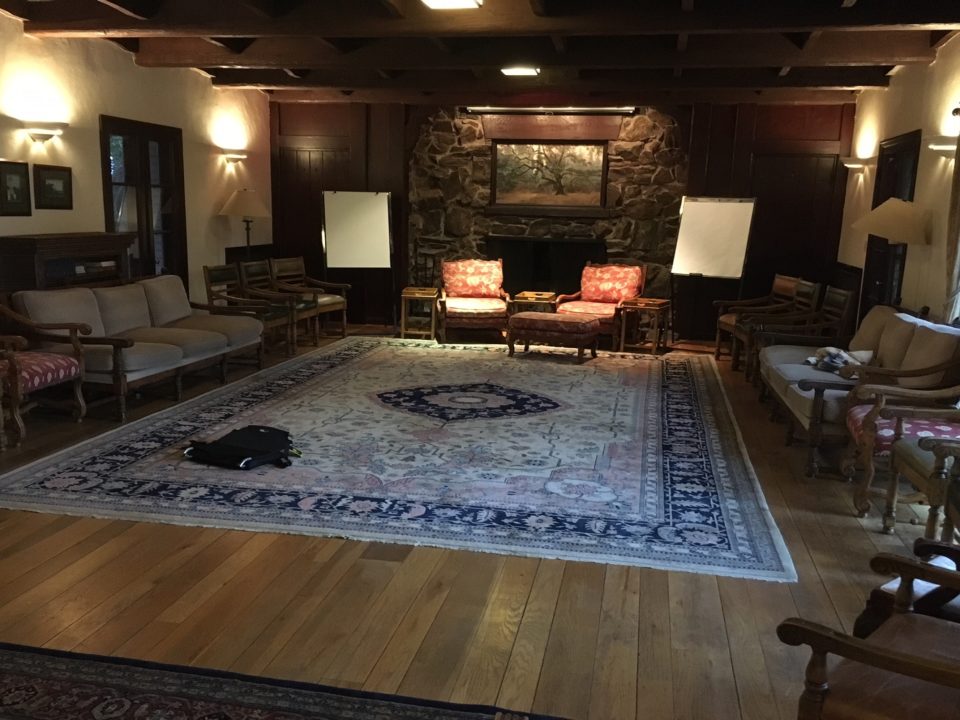When You Make Wonderful Changes
and Feel Worse Than Ever

How It Happened: The Sweat Lodge Phenomenon
December 2, 2010
10 Delusions of Personal Growth: Part I
December 2, 2010When You Make Wonderful Changes and Feel Worse Than Ever.
by Carl BuchheitPublished in 2008
One of our bedrock assertions at NLP Marin is that all human beings will be and do anything to make sure that their beliefs are true. Anything! We are meaning making beings. This is one of our specialties. Whatever we believe is true will be true, and whatever we believe things mean is what they will mean. Even better, to make sure that we are not wrong or crazy about this, we will have "good evidence" for everything, for every part of it. What we believe is so. No exceptions-except sometimes. I would like to explore one of those exceptional times in this and the next article or so.
We accomplish the amazing, perfect alignment of belief and "reality" through the local meaning-making magic of deletion, distortion, and generalization, and through the more non-local magic of using awareness to summon forth a whole world and, ultimately, a whole universe in all its parts. Put simply, we can make sure that things mean what they are supposed to mean precisely because we are just checking with ourselves-however other-than-consciously we might be doing that. We certainly get a lot of help from our families and the larger culture(s) in which we live, but we are basically just checking with ourselves, nevertheless. For example, if we "know" (believe) that an object is green, we will perceive a green object, which will then let us know that the object is green, around and around again in merry infinity of reality perception and perceived reality perfection. The famous 1948 illustration by M. C. Escher, below, says just about everything about this process.

It illustrates something called autopoesis, or self-creation. One hand is what we believe, and the other is the reality upon which those beliefs are based. Or, one hand is now, and the other is our future. I wonder if one hand knows what the other is doing? (I have to say, "The Secret" is a much better book title than "Autopoesis for Dummies," but I am fond of the word nevertheless.)
It is usually a good and pleasant thing when our autopoetic processes work magic that generates positive experience. "I have done some nice work on myself. Things are better, and I feel better!" is a pretty wonderful and sensible statement. However, "Things are better, but I feel way worse," is not pleasant at all. To generate strong negative feelings about having really positive results is a deeply confusing experience. But drive to not feel wrong or crazy means that we will endure any amount of perceived pain rather than-actually, instead of-experiencing that our bad feelings are not accurate reports about the reality of our world. As we grow and learn, as we come to trust and respect ourselves more and more, we may know full well that our negative, painful experience is completely wacky, shot through with contradiction and inconsistencies, but we will still make sure that it is "real and true." This seems to make things even worse-sometimes a lot worse.
Not only are humans meaning-making specialists, we are stubborn about it! Our wonderfully automatic, unremitting meaning-making stubbornness allows us to both create and stabilize our worlds. This is an incredibly important function. It lets us be human. It lets us rely on having a stable self across time and within that wider world we're pretty sure we're supposed to be involved with. There's a lot to be said for the stability afforded by all this stubborn certainty. (Marin-style NLP change-work is actually based on using our predictable patterning to make changes in our predictable patterning, but that is another article.)
But what happens when we just cannot get good changes to make good sense, when the good things that we know to be so are just too far from the bad experience we are feeling about them? What happens when the reality is so much better than the feelings that seem to be reporting on that reality-when our life experience is actually more positive than our belief systems can account for? This is very difficult territory. It is usually quite scary to be us when this happens.
I have worked with many clients who are caught in "the dilemma"-"My life is really great (or so I am told by people I trust), but my feelings about my life are still really, really, really bad - and this is sort of ruining my whole life, so it's not so great anymore, only I know it is, except that, based on how it feels to be me, my life is still totally awful, which must mean that there is still something really wrong with me, which is making me feel worse, and about which I am sort of starting to freak out, except that everything is pretty much better, only I can't feel it."
Yipes!
Some examples: a client with millions of dollars (much of it in gold!) and several very different businesses, but with the experience that it could (would!) all disappear instantly, including the gold-not in an economic downturn, but literally instantly. The more success this person created, which was a lot, the more terror they developed. I worked with someone whose relationship (primary, significant other relationship) developed into everything they wanted, yet they were certain that somehow, some way, something could instantly (again, that word) undo all of their remarkable accomplishments, in terms of being able to give and receive love. Another client developed superb success in the context of their job, along with all the acknowledgement and corporate trappings that mark this kind of success, but this person's feelings were those of someone constantly at the very edge of being humiliated and fired. (Again, the experience was that this could happen at any instant.) One more example: a client who worked creatively to revise a serious writer's block, who then had several published books to their credit, and whose feelings were, nevertheless, those of someone who would never be able to write or express themselves in any way. Also, again, there was a certainty that all of their books could simply be "taken away, instantly."
There is an excruciating good news/bad news dilemma (a situation in which someone must choose one of two or more unsatisfactory alternatives) in the experience of these people. One of two things just has to be hugely in error: either they are really wrong about the observable realities of their lives, or they are hugely wrong about themselves-about the reliability of their mean-making about self at the deepest levels. Those of us still struggling for the success these people had created might think, "What a great problem to have," but which would you choose to be "wrong" about-your ability to accurately know yourself, or your ability to accurately know your world?
This crazy-making dilemma presents a serious ecology problem-an unwanted consequence of otherwise wonderful growth and change-that is a challenge for the practitioner and the client both. The problem is, "How do we work with ourselves and others so that lives don't improve faster or farther than identity can explain, or so that our identity updates keep adequate pace with our life improvements?" My experience is that, using our Marin-style NLP, we can do marvelous change work that actually works, but that if we don't sufficiently and properly revise a certain belief, then there is nothing but trouble.
This really problematic belief is as simple as it is devastating:
"The most dangerous thing I can do is assume that I am safe."
It is usually a good and pleasant thing when our autopoetic processes work magic that generates positive experience. "I have done some nice work on myself. Things are better, and I feel better!" is a pretty wonderful and sensible statement. However, "Things are better, but I feel way worse," is not pleasant at all. To generate strong negative feelings about having really positive results is a deeply confusing experience. But drive to not feel wrong or crazy means that we will endure any amount of perceived pain rather than-actually, instead of-experiencing that our bad feelings are not accurate reports about the reality of our world. As we grow and learn, as we come to trust and respect ourselves more and more, we may know full well that our negative, painful experience is completely wacky, shot through with contradiction and inconsistencies, but we will still make sure that it is "real and true." This seems to make things even worse-sometimes a lot worse.
Not only are humans meaning-making specialists, we are stubborn about it! Our wonderfully automatic, unremitting meaning-making stubbornness allows us to both create and stabilize our worlds. This is an incredibly important function. It lets us be human. It lets us rely on having a stable self across time and within that wider world we're pretty sure we're supposed to be involved with. There's a lot to be said for the stability afforded by all this stubborn certainty. (Marin-style NLP change-work is actually based on using our predictable patterning to make changes in our predictable patterning, but that is another article.)
But what happens when we just cannot get good changes to make good sense, when the good things that we know to be so are just too far from the bad experience we are feeling about them? What happens when the reality is so much better than the feelings that seem to be reporting on that reality-when our life experience is actually more positive than our belief systems can account for? This is very difficult territory. It is usually quite scary to be us when this happens.
I have worked with many clients who are caught in "the dilemma"-"My life is really great (or so I am told by people I trust), but my feelings about my life are still really, really, really bad - and this is sort of ruining my whole life, so it's not so great anymore, only I know it is, except that, based on how it feels to be me, my life is still totally awful, which must mean that there is still something really wrong with me, which is making me feel worse, and about which I am sort of starting to freak out, except that everything is pretty much better, only I can't feel it."
Yipes!
Some examples: a client with millions of dollars (much of it in gold!) and several very different businesses, but with the experience that it could (would!) all disappear instantly, including the gold-not in an economic downturn, but literally instantly. The more success this person created, which was a lot, the more terror they developed. I worked with someone whose relationship (primary, significant other relationship) developed into everything they wanted, yet they were certain that somehow, some way, something could instantly (again, that word) undo all of their remarkable accomplishments, in terms of being able to give and receive love. Another client developed superb success in the context of their job, along with all the acknowledgement and corporate trappings that mark this kind of success, but this person's feelings were those of someone constantly at the very edge of being humiliated and fired. (Again, the experience was that this could happen at any instant.) One more example: a client who worked creatively to revise a serious writer's block, who then had several published books to their credit, and whose feelings were, nevertheless, those of someone who would never be able to write or express themselves in any way. Also, again, there was a certainty that all of their books could simply be "taken away, instantly."
There is an excruciating good news/bad news dilemma (a situation in which someone must choose one of two or more unsatisfactory alternatives) in the experience of these people. One of two things just has to be hugely in error: either they are really wrong about the observable realities of their lives, or they are hugely wrong about themselves-about the reliability of their mean-making about self at the deepest levels. Those of us still struggling for the success these people had created might think, "What a great problem to have," but which would you choose to be "wrong" about-your ability to accurately know yourself, or your ability to accurately know your world?
This crazy-making dilemma presents a serious ecology problem-an unwanted consequence of otherwise wonderful growth and change-that is a challenge for the practitioner and the client both. The problem is, "How do we work with ourselves and others so that lives don't improve faster or farther than identity can explain, or so that our identity updates keep adequate pace with our life improvements?" My experience is that, using our Marin-style NLP, we can do marvelous change work that actually works, but that if we don't sufficiently and properly revise a certain belief, then there is nothing but trouble.
This really problematic belief is as simple as it is devastating:
"The most dangerous thing I can do is assume that I am safe."




